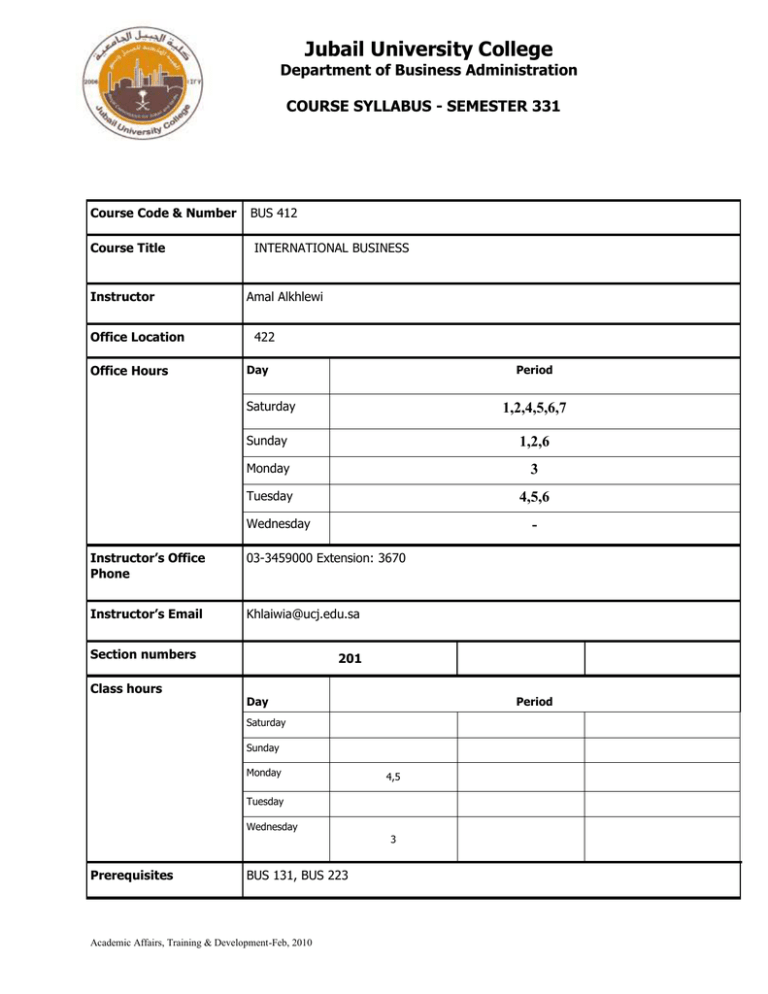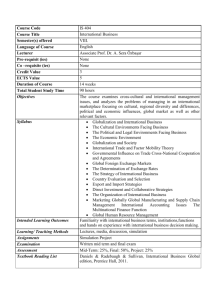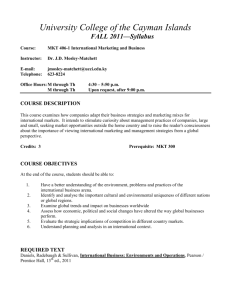Upon completion of this course, students will be
advertisement

Jubail University College Department of Business Administration COURSE SYLLABUS - SEMESTER 331 Course Code & Number Course Title Instructor Office Location Office Hours BUS 412 INTERNATIONAL BUSINESS Amal Alkhlewi 422 Day Period Saturday 1,2,4,5,6,7 Sunday 1,2,6 Monday 3 Tuesday 4,5,6 Wednesday - Instructor’s Office Phone 03-3459000 Extension: 3670 Instructor’s Email Khlaiwia@ucj.edu.sa Section numbers Class hours 201 Day Period Saturday Sunday Monday 4,5 Tuesday Wednesday 3 Prerequisites BUS 131, BUS 223 Academic Affairs, Training & Development-Feb, 2010 Course Rationale This course offers an introduction into the field of international business as well as provides the foundation for further specialization in the field. It begins with a brief overview of international business, focused on the concept of globalization. The course will then examine the environment for international firms, particularly the political, social, economic, technological and other configurations that support cross-border trade and investment. Amongst others, we will look at the role of national policies, cultures and business systems, the evolution of international markets in goods, services and finance. The course will then probe international firms: their strategies and organizational design, their entry modes into international enterprise, and their behavioral and control system. Discussion of current events/affairs and how these impact on international business is a major part of the course, for instance issues relating to international trade, foreign investment, financial crises, etc. Course Objectives Upon completion of this course, students will be able to: Develop an understanding of the worldwide developments and foundations for international business and the cultural context for managing in an overseas environment. Develop an understanding of the macroeconomic and political changes that have taken place in the era of globalization and beyond globalization. Investigate the political economy of international business, trade and investment. Describe and explain trade and the investment environment in which international business transactions occur. Develop an understanding of the global monetary framework in which international business transactions are conducted. Examine the strategies and structures that firms adapt in order to compete effectively in the international business environment. Develop an understanding of the horizons of international business and management in areas of social responsibility and ethics in the era of globalization. Methods of Instruction Lecture Supporting Materials: Lecture notes, newspaper articles and case studies. Required Textbook Basic text: International Business Environments and Operations: 13th Edition. Daniels, John D., Radebaugh, Lee H., and Sullivan, Daniel P., References: Rugman, Alan M. and Collison, Simon Collison, International Business, 5th Edition by FT Prentice Hall Proposed Websites http://www.prenticehall.com Grading Scheme Quizzes Assignments Midterm Examination Final Examination Total Academic Affairs, Training & Development-Feb, 2010 20% 20% 20% 40% 100% INTERNATIONAL BUSINESS COURSE OUTLINE WEEK 1 Chp 1 Topics and Activities Introduction to subject 2 1 Globalization and International Business 3 1 Globalization and International Business 4 2 Quiz 1 5 2 The Cultural Environments Facing Business The Cultural Environments Facing Business The Political and Legal Environments Facing Business 6 3 7 4 The Economic Environments Facing Businesses 8 4 The Economic Environments Facing Businesses Week 9 Midterm Exam 10 5 11 Globalization and Society 5 Globalization and Society 12 Quiz 2 13 14 6 International Trade and Factor Mobility Theory 7 Government Influence on Trade 9&10 Global Foreign Exchange Markets Academic Affairs, Training & Development-Feb, 2010 Notes Brief discussion on course content and lecture delivery What is International Business? Forces driving globalization What’s wrong with globalization? Why companies engage in International Business Why companies engage in International Business Modes of operations in International business Why International Business differs from domestic business The people factor Cultural awareness Behavioral practices affecting business Dealing with cultural differences The political environment The legal environment Legal issues in International Trade International economic analysis Elements of the economic environment Features of an economy Types of economic systems The means of Economic Transition Impact of FDI Economic impact of MNE The foundations of ethical behavior The legal foundations of ethical behavior Ethics and corporate bribery Ethical dilemmas Factor mobility theory Product Life Cycle Theory Theory of Absolute Advantage Theory of Comparative Advantage Economic rationale for Government intervention Non economic rationale for government intervention Instruments of trade control What is foreign exchange? How companies use foreign exchange Exchange rate arrangements Business implications of exchange rate changes 15 11 Types of strategy The firm as value chain Industry, strategy and firm performance The Strategy of International Business 16 17/18 Revision Final Examination Jubail University College Policies Attendance 1. Attending at punctual time: Present otherwise the student is absent. 2. Late attendance 0 < 5 minutes: is late 3. Late ≥ 5 minutes: is absent Notes: (i) Every 3 late are counted as 1 absent 2 (ii) Every × total semester contact hours + 1 is DN 15 Grading 1. Quality point: is the result of multiplying the credit hours by the grading points. 1. Semester GPA: is the result of dividing total quality points achieved in all courses at that semester by total graded credit hours of all courses in that semester. 2. Cumulative GPA in a semester: is the sum of total quality points achieved in all courses up to that semester divided by the total credit hours graded for all courses up to that semester Plagiarism & Cheating 1. Cheating is a serious offence and will be punished by the JUC. 2. Talking, looking at your colleagues’ exam papers or any other suspicious act is considered cheating during exam. 3. Student will fail the subject if caught cheating. Jubail University College Grading Scale Total Points Letter Grade A+ A B+ B C+ C D+ D F W WP WF DN I P Percentage 95-100% 90-<95% 85-<90% 80-<85% 75-<80% 70-<75% 65-<70% 60-<65% 0-<60% Withdrawal Withdrawal while Pass Withdrawal while Fail Denial Incomplete Pass Academic Affairs, Training & Development-Feb, 2010 Grade Point 4.0 3.75 3.5 3.0 2.5 2.0 1.5 1.0 0.0 N/A N/A 0.0 0.0 N/A N/A Academic Affairs, Training & Development-Feb, 2010



